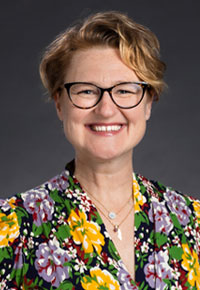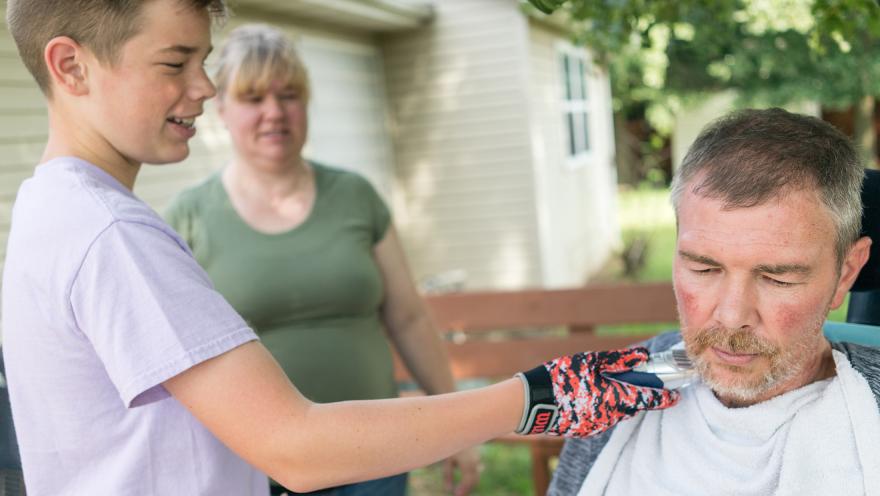In recognition of National Wellness Month, we will be exploring the many facets of wellness and the ALS community, shining a spotlight on the act of practicing healthy habits to attain better physical and mental health outcomes.
According to the American Association of Caregiving Youth, 1.4 million kids between the ages of eight and 18 have caregiving responsibilities for a family member or a loved one. While research supported by The ALS Association has shown youth caregivers in our community develop a sense of pride from being able to help a parent or a loved one, caregiving can also be a tremendous source of stress in their everyday lives.

On a recent podcast episode of Connecting ALS, we spoke with Dr. Melinda Kavanaugh, clinical social worker and associate professor at the University of Wisconsin-Milwaukee, to understand more about young caregivers and the potential harms caused by the lack of quality of sleep they receive and what can we do about it.
The transcript below has been lightly edited for brevity.
You've done so much work shining a light on the impact ALS has on kids, and I want to talk a little bit about a recent study that you were part of that looked into the impact ALS has on kids' sleep patterns and their sleep health. What led you to ask questions about the impact on sleep?
Many years ago, when I was in practice, I would be doing home visits with families living with neurological disorders and that's where I really started understanding this fairly complex and much more widespread issue of children and youth being caregivers. At the time kids would say off the cuff, "Oh, I had a hard time getting to school today," or "I kind of slept through class."
So, the qualitative data really supports the fact that kids would tell us many, many stories about falling asleep in class and not being able to wake up to go to school because they had been awake all night helping to care for their family member, their grandmother, their mother.
So, we had all this rich qualitative data and, again, and my clinical experiences as well, those two really came together to say, "Wait a minute. We don't know anything really quantitatively or in any sort of a research-based protocol to help us just start to wrap our minds around what's happening with sleep."
It's so critical with children and youth because those are the rich developmental time periods in their lives. So, if our kids aren't sleeping, their brains aren't developing, they're not really getting that rest and that ability to kind of refuel for the next day. That's really where the seeds were planted.
The study that we're here talking about today tries to put numbers behind that and have that quantitative data that can really help us understand what's going on. So, what did you learn trying to quantify this?
We had 20 kids evenly distributed between caregivers and non-caregivers, so that we could try to start wrapping our minds around what is different about this experience in the caregiving kids versus their age and gender-matched non-caregiving kids.
What we found is that the caregiving kids had a much less stable and kind of more fragmented sleep pattern, so it wasn't as robust. Even if the kids weren't getting up in the middle of the night to provide care, which many of them were, even if they weren't, their sleep wasn't sound. They were kind of disrupted and it was kind of fragmented.
If you can picture that what they were likely doing is doing a lot of tossing and turning, potentially doing a lot of kind of mental perseverating. We know in our caregiving youth that they do worry quite a bit throughout the day while they're at school. “Who's taking care of my mom or dad?” “How are they doing?” “Did they fall?” “Are they choking?” So, it makes perfect sense that that would be exhibited in their sleep patterns as well.
The next thing we wanted to understand was how is the act of care, so the in-the-moment of care, is that mentally disruptive? Then again, kind of the bigger picture, are these kids sleeping as consistently as we found in that small feasibility study, but what is it about the act of care itself that might be more stressful or might be more anxiety-inducing that might then continue to contribute to this struggle with a kind of positive sleep pattern?
That study's still ongoing, but currently we have found that we gave children and youth an app on their phone and when they were in the moment of care, they got to tell us, "I feel good." "I feel stressed." "I feel anxious." "I like doing this." "I don't like doing this." They got to tell us how they felt in that moment of care.
Some of the interesting things we're seeing is that the children and youth, much like adults, feel the same way in the moment of care, both positive and negative. They like the opportunity to provide care, but it can be very, very stressful and they're telling us that. They're telling us that they feel positive about themselves, but about the care, they're tired, it can be very exhausting, it does stress them out.
What we did find is that in the moment, and again this is still some preliminary data, but one of the interesting things we found is that the type of care does influence how they feel about it. Even though they might be stressed or anxious or worried about it, if it's kind of a basic care task, kind of “I'm lifting or transferring,” there's less of an emotional component to them. They might be overwhelmed about it, but they describe less feeling kind of like emotional or sad about it.
It's the times when they are providing emotional care to their family member, so they're providing care that is in response to that emotion from their family member with ALS, that the youth are struggling with being able to manage their own positive mood.
Let me say that in another way. When they're meeting the emotional needs of their family member, their emotions are also all over the map and they're less positive about that because they're trying to take care of the emotions of someone else and they're less attuned to taking care of their own emotions, which I think is really interesting, particularly for children and youth who are really trying to figure out who they are and what they are doing and what is happening in their own lives.
What that tells us, and again preliminary data, is that they need as much emotional support as we could possibly provide them. They need hands-on care and the education and training on the tasks that they're doing, but they also need to be able to say, "Hey, this is emotional, and I want to be there and help my mom or dad, but I need someone to be there to help me."
What does that support look like? How do we make sure these kids have the tools they need and the support they need so they're managing to get a good night's sleep and all the things that that entails?
Well, the very first thing we can all do is acknowledge that they exist and acknowledge they're providing the care they provide. Kind of writ large as a society if you will. We don't really recognize the care that children and youth play. We tend to either gloss over it or think it's just kind of no big deal. But if we all take a moment and ask the children and youth in our families how they're doing? Are they helping to take care of somebody? What does that look like? How can we help them? What can we do?
Sometimes it's just being that listening ear. Just being that person that acknowledges they exist and the things they're doing are extraordinary and worthy of recognition and worthy of support. So, it's a basic, but I say this a lot. Acknowledge them, acknowledge those children and youth, give them an ear to talk to and then develop some sort of a support program that is peer-engaged.
Children and youth have told me, every study I've ever done, they don't have enough peers that get what their life is like. So, anything that we can do, and we, being the healthcare providers, social providers and nonprofit disease organizations, anything that we can do that brings kids together to let them connect and chat and build that cohesion.
One of my other big projects that I have developed with a lot of support through The ALS Association is the YCare Program. It's a day-long modular program. We just did a beautiful version of it in Texas with The ALS Association Texas Chapter and Texas Neurology, where we get kids together, they're all kids in caregiving roles and they learn how to do the skills correctly by those healthcare professionals who know ALS.
The cool thing is they all meet each other and by the end of the day, with the exception of a sibling group, they were all calling each other best friends. They were exchanging phone numbers. They were telling their parents they want to hang out with each other. So yeah, we were giving them the education and the tools and the skills, but really, we were building those peer relationships.
So, I think that we acknowledge them. We give them the respect they deserve for the work and the engagement and the love that they show their family members. Then we provide support opportunities for them to build peer relationships, so they don't feel isolated and alone.
To find additional resources for youth education and support for those impacted by ALS, visit our website here.
To listen to the full episode with Dr. Kavanaugh, “Preventing Harms to Young Caregivers,” visit ConnectingALS.org here.
To continue to follow stories about people living with ALS in the community and learn more about the disease, subscribe to receive our weekly blogs in your inbox HERE or follow us at als.org/blog.


Comments
Thank you for doing this work. Acknowledging that kids do a lot of this really tough work is very meaningful. I related to a lot of what was said. My siblings and I grew up caregiving for our mom, who had ALS. The physical tasks were often exhausting and frustrating, but serving mediator or emotional support roles for both the ill and healthy parents was, in my experience, the most painful, confusing. Caregiving in general is very difficult, isolating, and emotionally painful/complicated. The Y group sounds amazing, I wish we had that. I would love to connect with other (now adult) children of people with ALS.
Join the conversation. Please comment below.